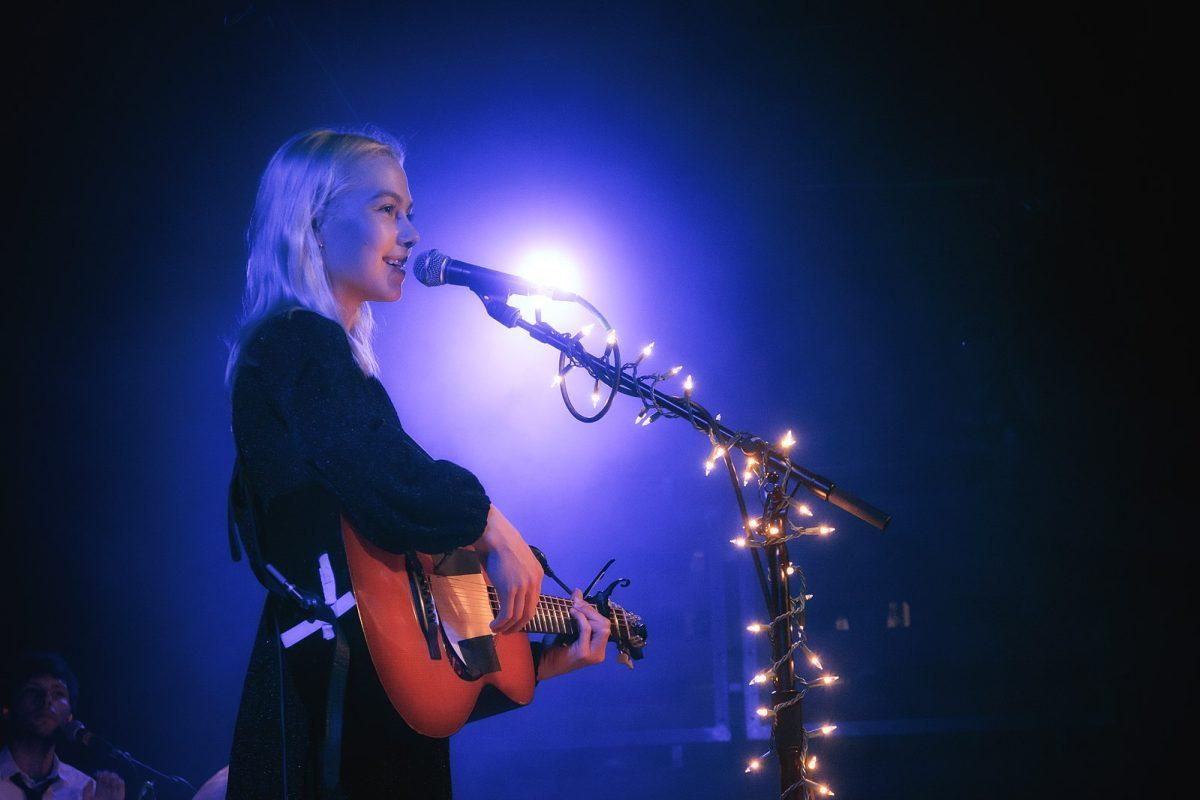One of the unexpected success stories of 2020 was that of Los Angeles-based musician Phoebe Bridgers. Seemingly overnight, the artist known for her emotionally-charged lyrics and dry wit became a household name. The question of how the 26-year-old compounded so much success has left the industry astounded. For fans, it just made sense.
Part of Bridgers’ momentum can be attributed to her sophomore album Punisher, which was released June 17, 2020 through the record label Dead Oceans. Punisher made it into the Billboard Top 200, and singles like “Kyoto” and “Garden Song” became instant fan favorites, the former landing Bridgers two of her four Grammy nominations for the year. The album topped countless year-end top album lists, from Pitchfork to Rolling Stone to The New Yorker, and received “universal acclaim” on Metacritic — clearly, Bridgers’ talent and craft were well-received.
As Punisher rose to prominence in 2020, TikTok likely also contributed to Phoebe Bridgers’ ubiquity. “Motion Sickness,” the biggest single off of her debut album Stranger in the Alps, had a prolonged moment in the spotlight as a popular audio on the video-sharing app. Making this part of her discography so identifiable via social media cemented Bridgers in the popular consciousness, further adding to her momentum.
It is hard to avoid the trends that dominate. At a college like Wellesley, it is even harder to avoid when artists like Phoebe Bridgers enter the spotlight. Wellesley’s position as a historically women’s college means the student body is well aware of how much harder anyone who is not a cisgender man needs to work to succeed. The alternative and independent music spheres have especially been dominated by cishet white men through the years. Bridgers, as an openly bisexual woman, tells a story that many Wellesley students relate to.
That is not to say that Bridgers is especially groundbreaking in terms of representation, or should be lauded as any sort of exhaustive diversity. As a white cisgender woman, Phoebe Bridgers most certainly benefits from fitting into certain oppressive norms that persist in commercial music. Her perspective is far from universal for women, musicians or the queer community. A significant part of her platform is a result of privilege; her active awareness of that fact does not negate it.
When asked on Twitter, many students were eager to share their experiences with and thoughts on Bridgers and her music. At one end of the spectrum, Jess Stoker ’23 described their experience of having their “For You Page” on TikTok being full of enthusiastic Bridgers fans “without having listened to any of her music.” Others described fleeting associations with the artist, many knowing a small handful of songs or having funny anecdotes about Bridgers entirely unrelated to her music.
Multiple students who responded spoke in-depth about what Bridgers’ music means to them. Jasper Sacco ’22 succinctly said “I love Phoebe Bridgers” before going into more detail. “Okay she’s a white woman yes but … I still feel her energy is so dynamic in her music and she speaks so deeply on themes of loneliness and longing,” Sacco explained, particularly referencing “Garden Song” from Punisher as their favorite.
Abby Martinage ’24 reflected extensively on her journey with Bridgers’ music. She described how “the demo version of ‘Motion Sickness’ was on my Spotify Discover [Weekly Playlist] like four years ago and I didn’t listen to a single other song by her until this year but now I absolutely adore her … Recently I’ve gotten more into Stranger in the Alps and Boygenius [the 2018 self-titled album released by the band Bridgers created alongside Lucy Dacus and Julien Baker].” Connecting these events, Martinage said, “it’s just kinda nice how she came back into my life at a point where her music fit[s] so well into the vague feelings I couldn’t quite put my finger on.”
A common thread among testimonials was the emotions Bridgers calls on and evokes in her work. Many students reflected on how “Kyoto” resonated with them because it describes a complex familial relationship not often explored in popular music. A member of the Class of 2024 speculated that Bridgers is so popular because “her music gets at a lot of specific feelings around relationships and identity that resonate with a lot of the traits exemplified by the Wellesley student body.”
Regardless of what drove it, Phoebe Bridgers’ rise to fame and the catharsis it has created for Wellesley students is an interesting case study in identity and expression. Whether you have been following her since Stranger in the Alps, or only recently caught onto “I Know The End” thanks to Saturday Night Live, you have likely found yourself unable to avoid Bridgers’ crooning melodies. Her music just works; As Catie Hanna ’24 put it, it is “pretty and good for crying on the floor, y’know?”





